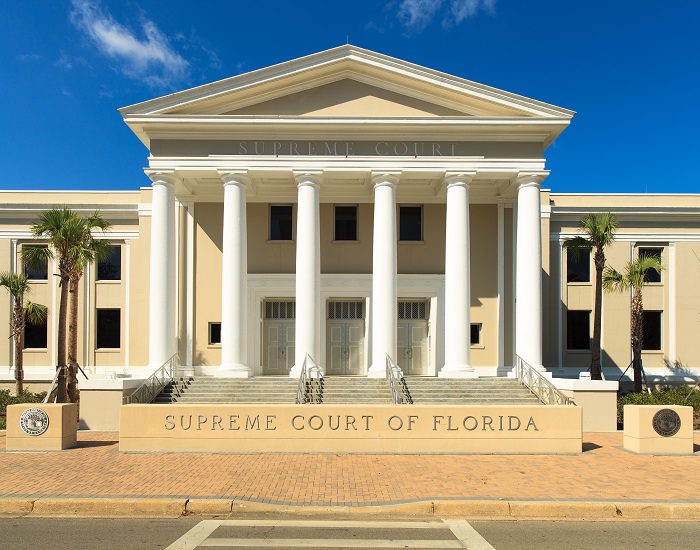 The Florida Supreme Court recently resolved a split in Florida law on the issue of attorney’s fees in favor of consumers, holding that debtors who prevail when a creditor sues under an account stated cause of action instead of for breach of the underlying credit card agreement are entitled to recover attorney’s fees under the so-called “reciprocity provision” of subsection 57.105(7), Florida Statutes.
The Florida Supreme Court recently resolved a split in Florida law on the issue of attorney’s fees in favor of consumers, holding that debtors who prevail when a creditor sues under an account stated cause of action instead of for breach of the underlying credit card agreement are entitled to recover attorney’s fees under the so-called “reciprocity provision” of subsection 57.105(7), Florida Statutes.
A copy of the opinion is available at: Link to Opinion.
On the same day, the Florida Supreme Court also resolved another split in Florida law on the issue of attorney’s fees in favor of consumers in the context of mortgage foreclosure, holding that a borrower who prevails in a mortgage foreclosure action in which the mortgagee could not prove it had standing to enforce the note and mortgage containing a unilateral attorney’s fee provision when the lawsuit was filed is entitled to recover attorney’s fees under the reciprocity provision of subsection 57.105(7).
A copy of the opinion is available at: Link to Opinion.
In the credit card case, the Court reviewed a 2018 ruling of the First District Court of Appeal, Ham v. Portfolio Recovery Associates, LLC, “which certified conflict with the decision of the Second District Court of Appeal in Bushnell v. Portfolio Recovery Associates, LLC….” also decided in 2018.
“In Ham, the First District ruled that section 57.105(7) was inapplicable because the actions for account stated did not rely on the credit card contracts containing the fee provisions. … Accordingly, the district court held that the debtors could not recover attorney’s fees. … In contrast, the Second District in Bushnell held that the debtor was entitled to attorney’s fees under section 57.105(7), reasoning that the account stated claim and the underlying credit card contract were inextricably intertwined.”
The Court began its analysis by explaining that “the certified conflict issue requires us to determine whether the unilateral attorney’s fee provisions in the credit card contracts are made reciprocal to the debtors under section 57.105(7).”
It then explained that in interpreting a statute, the Court adheres to the rule that “[t]he words of a governing text are of paramount concern, and what they convey, in their context, is what the text means.” In addition, “every word employed [in a legal text] is to be expounded in its plain, obvious, and common sense, unless the context furnishes some ground to control, qualify, or enlarge it.”
The Court then proceeded to analyze the text of section 57.105(7) and the parties’ “competing interpretations of what is required under section 57.105(7). In the debtors’ view, the statute applies when two requirements are satisfied. First, the contract must ‘have a provision allowing attorney’s fees to a party when he or she is required to take any action to enforce the contract,’ and second, the other party that is seeking fees must ‘prevail[] in any action, whether as plaintiff or defendant, with respect to the contract.’”
The plaintiff debt buyer, “on the other hand, contends that the statute is applicable when (1) an action is brought to enforce a contract which contains a unilateral fee provision, and (2) the party not named in the fee provision prevails in that action. According to [the plaintiff debt buyer], an account stated claim cannot be considered an action to enforce a contract.” It “also argues that it — as the party benefitting from a unilateral attorney’s fee provision — gives up its right to collect fees from consumers when it chooses to file a common law cause of action.”
The Court concluded that “the result reached in Bushnell and sought by the debtors is supported by the text of section 57.105(7). … It is readily apparent that the argument presented by the debtors closely tracks the text of the statute while [the debt buyer’s] argument — which was accepted by the First District — diverges from the text. The ‘enforce the contract’ language describes what is required of the contractual provision — not of the claim raised by the plaintiff. … The ‘with respect to the contract’ language, however, presents a question that requires considering the claims actually litigated and determining the existence of the required relationship between the contract and the litigation in which the other party prevails.”
The Court reasoned that an “[a]ction to collect an account established under a contract is encompassed by the phrase ‘any action to enforce the contract.’ So the first element of section 57.105(7) is readily satisfied by the terms of the credit contract fee provisions.”
Thus, the Florida Supreme Court rejected the debt buyer’s argument, and the First District’s holding in Ham, “that the credit card contract fee provisions did not extend by their plain terms to account stated causes of action. There is no tenable argument that a provision authorizing fees for action to collect a debtor’s account does not encompass account stated claims.”
The Court then turned to analyze the last question remaining: “whether the second element of [section 57.105(7)] was met — that is, whether the debtors ‘prevail[ed] in any action, whether as plaintiff or defendant, with respect to the contract.’ … Namely, whether the account stated action in which each debtor prevailed was an ‘action … with respect to the contract.’”
The Florida Supreme Court analyzed the dictionary definition of “with respect to” and “respecting,” reasoning that they are broader than “based on,” “under” or “pursuant to.” “Although the account stated claims brought by [the debt buyer] could not fairly be said to be claims brought ‘based on,’ ‘under,’ or ‘pursuant to’ the credit contracts, there is nonetheless a clear and direct relationship between the credit contracts and the account stated claims. As the First District recognized, an essential element of an account stated cause of action is proof of the existence of a business relationship between the parties.”
The Court reasoned that the “business relationship and the previous transactions between the debtors and the creditor were predicated on the credit card contracts. Without those contracts, there would have been no business relationship or previous transactions. The accounts that the creditor sought to collect came into existence as a result of the operation of those credit card contracts. Thus, it is a fair reading to say that the account stated actions on which the debtors prevailed were actions ‘with regard or relation to’ those credit card contracts and the second element of the statutory provision was therefore satisfied.”
The Court rejected the dissent’s argument that the “with respect to” language of the statute should be strictly construed because it “would deny attorney’s fees to a prevailing debtor in litigation even though the prevailing creditor in the same litigation would be eligible for an award of fees based on the unilateral contract provision.”
The Court also rejected the argument “that allowing the debtors fees somehow precludes [the debt buyer] from choosing its cause of action [because it] was free to choose any action that might be available to enforce its rights. The issue of fees is a separate matter that depends on the contractual provision relating to fees and the relationship of the action brought to that contract.” In short, the debt buyer ‘had no right to alter the impact of those provisions by unilaterally disavowing an intent to rely on them.”
The Court approved “the result in Bushnell and quash[ed] Ham[,]”concluding that “the unilateral fee provisions in the credit card contracts are made reciprocal to the prevailing debtors under section 57.105(7).”
In the mortgage foreclosure case, the Court reviewed the Fourth District Court of Appeal’s en banc holding “that a borrower who successfully argues that the bank lacked standing at the time suit was filed ‘cannot rely on the contract to obtain attorney’s fees’ under section 57.105(7).” As succinctly put by the Fourth District, “NO STANDING = NO ATTORNEY’S FEES.”
“The Fourth District in Page certified conflict with the Fifth District Court of Appeal’s decision in Madl v. Wells Fargo Bank, N.A. … and the Second District Court of Appeal’s decision in Harris v. Bank of New York Mellon, … both of which held that a borrower who successfully argues ‘lack of standing’ can be awarded fees under section 57.105(7) if it is otherwise established that the plaintiff became subject to the unilateral fee provision in the contract.”
Once again, the Court turned to the text of the statute, concluding “that the borrowers are eligible to recover reciprocal fees under the statute … [because] [i]n each case, the contract provided for attorney’s fees for a party when that party ‘is required to take any action to enforce the contract,’ … and in both cases the borrower ‘prevail[ed] in an[] action … with respect to the contract….”
Because in the Florida Supreme Court’s view the two statutory conditions were met, the Court quashed Page and approved Madl and Harris.
Photo: Fotoluminate LLC/stock.adobe.com


